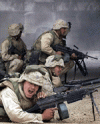

| Online: | |
| Visits: | |
| Stories: |

| Story Views | |
| Now: | |
| Last Hour: | |
| Last 24 Hours: | |
| Total: | |
Update for Monday, March 28, 2016
I'm going to devote today's post to Kenneth M. Pollack's Iraq situation report, mostly because I think he is largely right on the facts (even if we may differ on their implications).
First, there are some 5,000 U.S. troops in Iraq, not the 3,800 officially announced, and they are more engaged in combat than we are generally led to believe. That said, it's a small number and Iraqi forces of one kind or another really are doing the work. And they have gotten better. For some reason he doesn't say anything specifically about the peshmerga, but he does say that the U.S.-led coalition has trained 6 Iraqi brigades who are performing well, and that there has been some improvement in the Iraqi command culture. The Iraqis are less demanding of unnecessary close air support, which leaves coalition aircraft free to strike more important IS targets.
The result is that IS is losing. They are losing territory, and Sunni Arabs within what is left are finding the courage to turn against them and join the popular mobilization. Although Pollack thinks it will still be 6 to 12 months before Mosul falls, he thinks IS troops are losing morale and are unable to mount effective offensives.
The bad news, however, is the risk of catastrophic success. There is no plan in place to build an Iraqi nationalist culture once the common enemy is gone. The Iranian-backed militias may well remain, and competing groups will rush in to try to grab what they can if IS collapses. The result may be a new phase of civil war, rather than anything that looks like a success. Of course this is what happened after the 2003 invasion — there was no plan to rebuild the Iraqi nation-state, and there doesn't seem to be a plan now, either. As Pollack concludes:
Unfortunately, as has been a trademark of American involvement with Iraq at least since 2003 (and arguably since 1991), military success is not being matched with the commensurate political-economic efforts that will ultimately determine whether battlefield successes are translated into lasting achievements. In particular, the absence of developed and resourced plans to deal with post-conflict stabilization and reconstruction, and the lingering question regarding the future status of the militias raise huge questions about whether these victories will prove as ephemeral as America’s many past triumphs in Iraq.
Sigh.
Source: http://warnewstoday.blogspot.com/2016/03/update-for-monday-march-28-2016.html


